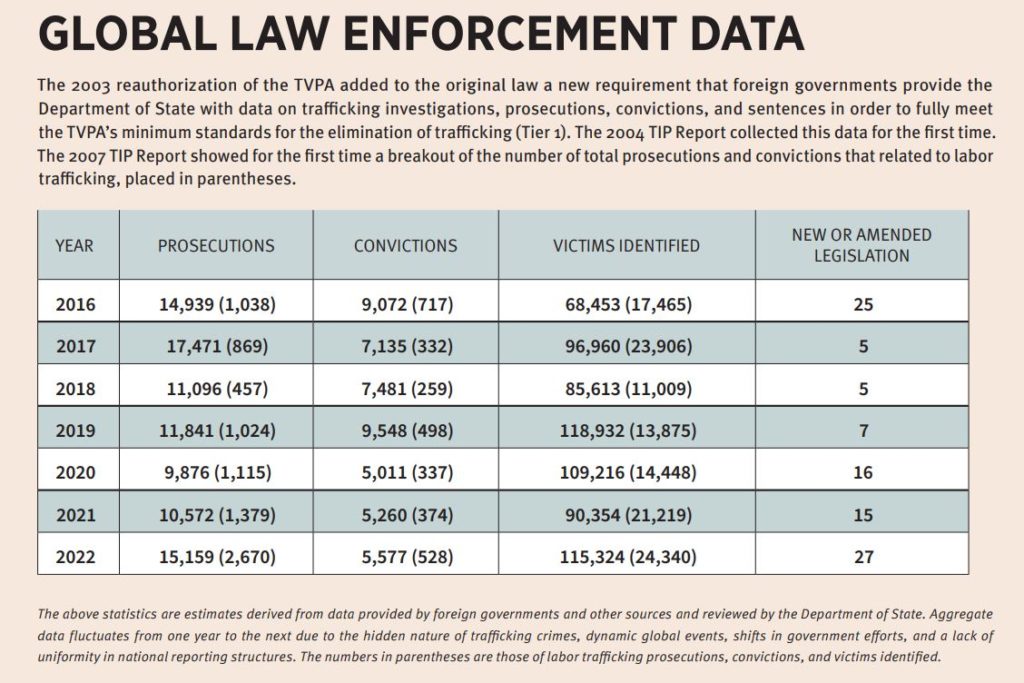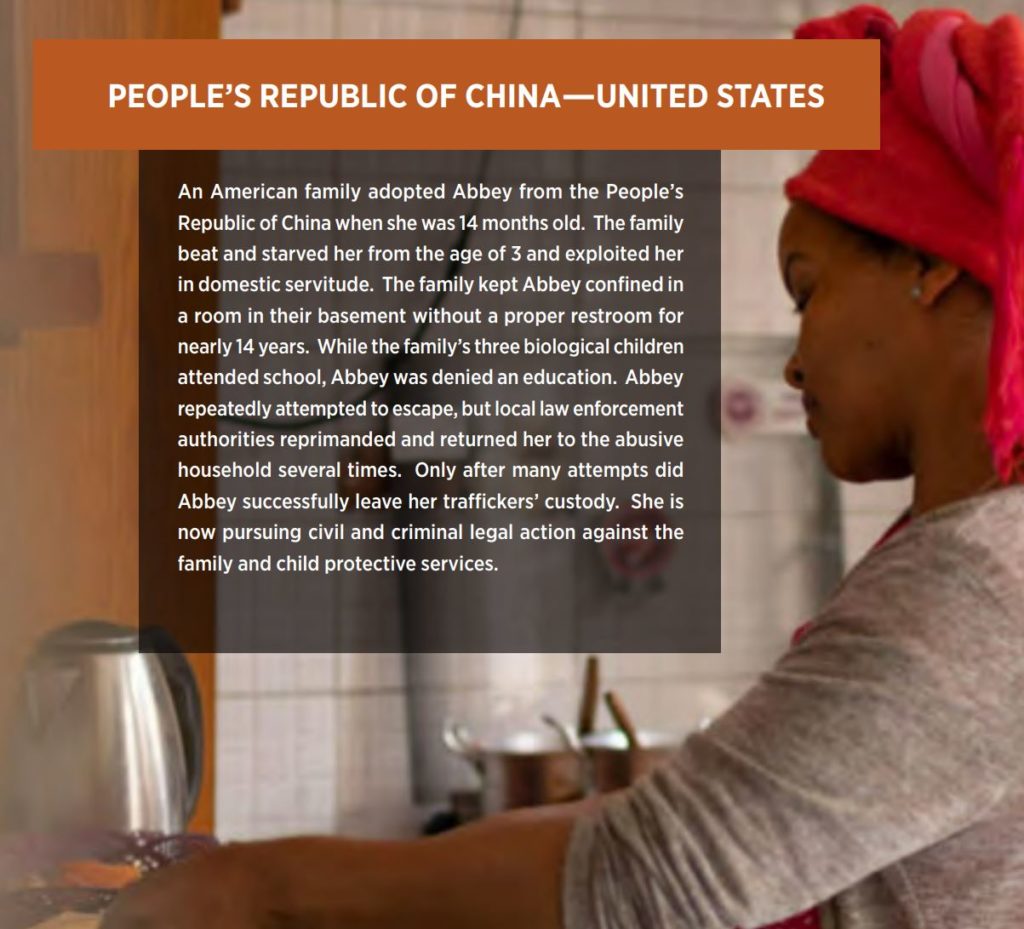The U.S. Department of State recently released its 2023 Trafficking in Persons (TIP) report. This annual publication compiles survivor perspectives, uncovers emerging trafficker tactics, and ranks government responses across the globe as a critical tool in combating modern slavery.
Similar to the 2022 report – which we highlighted here – traffickers continue exploiting millions of vulnerable people through both forced labor and sex trafficking.[1] Yet, promising solutions also continue to emerge, guiding collaborative and effective anti-trafficking efforts both internationally and right here in Pennsylvania.
Here are some key take-aways from the report.
International Rankings, Statistics, and Survivor Stories
The Department of State ranks countries’ anti-trafficking efforts, with restricted foreign assistance to governments failing to protect their vulnerable populations. As part of meeting anti-trafficking standards, each foreign government provides law enforcement data to the Department, including prosecutions, convictions, identified victims, and even legislation relevant to human trafficking (see the total law enforcement data for each year in the chart below). The report provides comprehensive rankings of governments, as well as regional breakdowns of the law enforcement data below. One highlight includes that last year brought the highest amount of prosecutions, the second highest number of victims identified, and the highest amount of new or amended legislation across the globe.

While statistics and rankings provide a crucial foundation from which to launch anti-trafficking strategies, the authors also stress that survivor stories and experiences must inform every tactic and response. The report is full of compelling survivor stories, such as Abbey’s experiences coming to America:

International Trends of Trafficker Tactics and Anti-Trafficking Responses
Accountability in Supply Chains
Human trafficking pervades industry supply chains, such as agriculture and manufacturing, particularly as companies increase outsourcing to areas with lower costs and fewer worker protections. Some countries have begun making businesses liable when knowingly benefiting from human trafficking[2] and many companies have also voluntarily embraced codes of conduct. Yet, as social auditing of ethical supply chains have arisen to meet increased demand for transparency, many manufacturers have become adept at manipulating the process to conceal violations.
In response, practitioners recommend policies to increase meaningful accountability: more frequent, unannounced, and extensive audits, sustained worker engagement off-premise and beyond the audit, and increased messaging of worker rights and resources.
Boys and Human Trafficking
Boys represent the fastest-growing segment of identified human trafficking victims, with the percentage of boys identified from among all victims quintupling between 2004 and 2020. Overall, 40% of victims are male – yet social stigmas mean they continue to be overlooked and underserved.
Potential solutions include targeted public awareness efforts, training for front-line workers, safe housing, comprehensive care and support, and employment assistance.
Online Recruitment
In an increasingly digital world, traffickers are exploiting the largely unregulated and unmonitored internet to target vulnerable, marginalized populations. Anonymity and false presentation in online dating, employment, and social media platforms allows traffickers to misrepresent themselves and mislead targeted individuals into underpaid and coercive situations.
In response, the report recommends governments, civil society, and technology companies partner to enhance digital literacy, require proof of legitimacy to advertise employment, and establish proven anti-trafficking company policies.
State-Sponsored Trafficking
Some governments directly compel their citizens into sexual or labor slavery. Coercion can include withholding public benefits and salaries, skirting labor laws, manipulating legal status, and threatening to harm an individual’s freedoms or family.
In response, the Department of State explicitly calls out and negatively ranks governments that participate in human trafficking – subjecting these countries to potentially reduced foreign assistance. The TIP report finds 11 governments have a “policy or pattern” of human trafficking, trafficking in government-funded programs, forced labor in government-affiliated medical services or other sectors, sexual slavery in government camps, or the employment or recruitment of child soldiers: Afghanistan, Burma, China, People’s Republic of Cuba, Eritrea, Iran, Korea, Democratic People’s Republic of Russia, South Sudan, Syria, Turkmenistan.
Cyber Scam Operations
Traffickers have also taken advantage of the COVID-19 pandemic instability, luring desperate workers to casino and shell company sites. Rather than fulfilling their advertised employment promises, however, companies force recruits – through abuses ranging from debt bondage to withholding food and water – to run internet scams directed at international targets.
Governments have begun locating and attempting to repatriate their citizens from these exploitative circumstances, but much work remains. Enhancing awareness of these practices is the first step in establishing collaborative practices to expose and prevent forced cyber scam operations.
Solutions
The Non-Punishment Principle to Protect Victims
Central to a victim-centered and trauma-informed approach is protecting victims against penalization for unlawful acts solely committed as a direct result of being trafficked. Often, state laws prosecute victims for crimes such as use of false documents, theft, and solicitation despite their trafficker’s coercion – harming victims by creating housing, financial, and employment barriers and making repeat victimization more likely. Further, this harms prosecution efforts as victims fear public authorities.
Federal and state laws must reflect this “non-punishment principle” to both proactively identify victims and connect them with supports rather than a cycle of punishment.
Child Soldiers Prevention Act
Government and non-state armed groups unlawfully recruit and use children as soldiers or for labor and sexual slavery in conflict situations. The Child Soldiers Prevention Act requires the TIP report to include a list of countries that endanger children as soldiers, subjecting these countries to restrictions in an effort to eradicate this extremely dangerous exploitation of children.
Partnerships as the Foundation for Success
The report stresses the importance of partnerships to successfully implement the anti-human trafficking strategies of prosecution, protection, and prevention.
“Strategic, multi-disciplinary partnerships can enhance the work of governments, the private sector, NGOs, and survivors and survivor-led organizations to further investigations and prosecutions, support victim identification and protection efforts, and develop targeted prevention programs.” (Page 12.)
These crucial partnerships include intergovernmental and private sector collaboration – underscoring the importance of survivor-focused, community-based nonprofits such as Greenlight Operation. Fundamentally, partnerships must commit to mitigating further harm to survivors by actively including them and accurately representing the crimes against them.
We encourage you to read the entire report for stories of heroism and survival, and to reach out if you are inspired to engage with and bring solutions to your community.
_____
[1] Human trafficking is defined as a crime whereby traffickers exploit and profit by compelling adults or children to perform labor or engage in commercial sex. Both the U.S. Trafficking Victims Protection Act and the U.N. Protocol to Prevent, Suppress and Punish Trafficking in Persons define both types of trafficking within the framework of trafficker acts (recruiting, transporting, obtaining persons, etc.), means (force, fraud, or coercion), and purpose (exploitation of the victim). A commercial sex act involving a child under 18 is always a crime, regardless of means.
[2] U.S. law provides that a legal person or business is liable for penalties if knowingly benefiting from a human trafficking scheme.